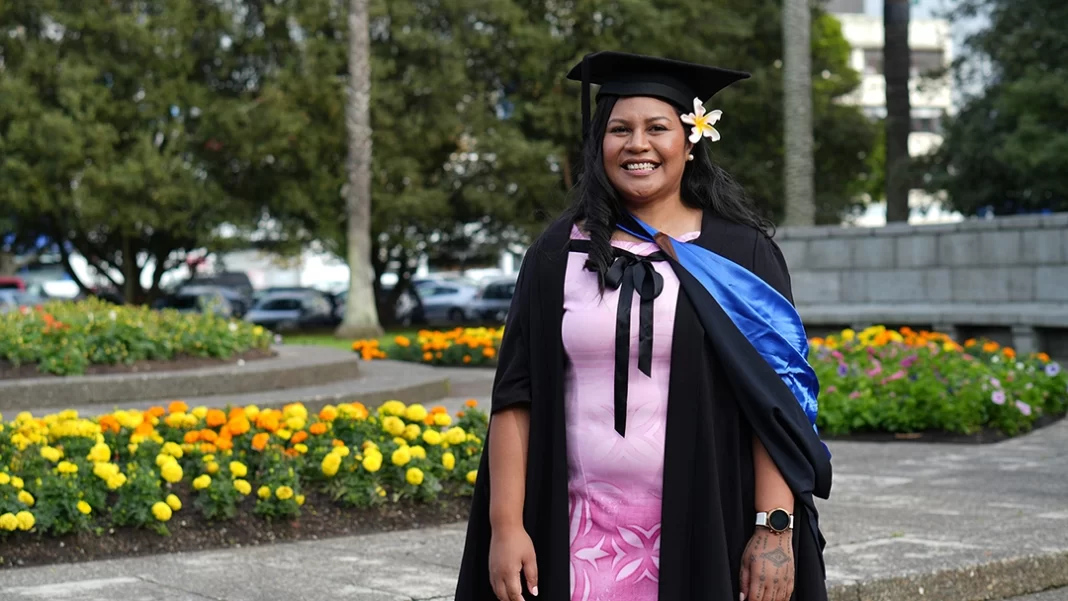University of Auckland Masters graduate Roselie Leota says the courage of her parents to forge a new life in Tāmaki Makaurau, Auckland enabled the dream of her ancestors to be fulfilled.
“This is not just my achievement but the continuation of a legacy, and a dream planted long before me. I am walking in their legacy and sitting in answered prayers,” says Roselie, who graduated with a Masters in Speech and Language Therapy Practice on 15 May at Spark Arena.
The married mother of two was born in American Sāmoa. Her parents, Fepulea’i Fomeni Fa’asuamaleaui and the late Malia Ivoga Lata-Fa’asuamaleaui, moved to Aotearoa New Zealand seeking greater opportunities. Roselie (Leulumoega, Āmaile, Salea’aumua, and A’ufaga) was just six when they made the move.
“I was raised in the heartiest part of South Auckland – ‘275 Māngere’. If you’ve seen the film Tinā, you’ve caught a glimpse of my childhood,” she says, referring to the film’s main character who rose from humble beginnings.
“When they first arrived, my parents worked as cleaners, labouring tirelessly to build a better future for me and my six siblings.”
A close-knit family, the children often accompanied their parents to work—sometimes helping, sometimes waiting in the car. Over time, her parents progressed to higher-paying jobs. Her father became a bus driver while her mother became the first in the family to attend university, earning a Bachelor of Education while working night shifts at a Mt Wellington factory.
“My parents were driven by love and deep faith. They made sure our Christian values were not only taught but lived.”
Roselie initially pursued teaching, completing a Bachelor of Education. But during her final year—amid the COVID-19 pandemic—a placement at a low-decile school revealed a gap in the curriculum.
“There was little preparation for working with neurodiverse learners, and even less support for teachers,” she says.
This led her to explore Speech and Language Therapy, and she was accepted into a Masters programme. A year in, she and her husband Peniamina Leota learned their youngest son would need extra support.
“He was diagnosed with autism. That first year gave me tools to support him—and a deeper sense of purpose.”
She took a gap year to support his transition into primary school.
“I wanted to be present, to advocate for him and help build the foundation he needed.”
Returning to full time study while managing family life was tough. There were frequent school calls, and staff sometimes misunderstood her son’s needs—like his use of noise-cancelling headphones during heavy rain.
“I’ve spent countless hours in meetings, writing emails, making phone calls—working closely with teachers and the principal to create a more supportive environment.”
She often questioned whether she’d finish. There were daily commutes, expensive parking, and rushing between university and school.
“I’d arrive late to class and leave early. I never knew what I’d missed—it was tough!”
Sometimes she drove across town late at night just to find a quiet study space.
“Tai Tonga campus closed early, so I’d drive from Māngere to Kate Edgar or Grafton just to study.”
“So yes, undoubtedly the highlight of my academic journey has been completing it.”
She thanked the village that helped her cross the stage.
“First and foremost, all glory to God—His unending love and grace carried me. To my loved ones who’ve passed: I sit here in the fulfilment of prayers answered through your sacrifices.”
“To my aiga (family) thank you – your love, prayers, and quiet strength have carried me through every season of this journey. Whether near or far, your support has been the steady foundation beneath my feet.”
To her husband:
“Your unwavering faith and love supported me. Your dedication to our family gave me the space to study. In every moment I felt like giving up, you reminded me of my purpose.”
To her parents:
“Thank you for your courage, resilience, and deep love in starting over in a foreign country.”
She acknowledged the Tai Tonga whānau for their encouragement and love, with special thanks to Maselina, Malakai, Seulele, and Claire Chang:
“Your wisdom, presence, humour when I needed to laugh, encouragement and honesty when I needed grounding—they were all gifts I never knew I needed.”
To Keryn and the Mana Toa team—thank you for graciously supporting my request and making the final stretch of this journey possible. This achievement would not have been possible without your help.
She also extended heartfelt thanks to her supervisor, Dr. Elaine Ballard:
“Thank you for your patient, belief in me, and your deep passion for Pacific people—your steady guidance carried me through.”
Finally, to her research participants:
“Thank you for sharing your stories with me—so openly, so honestly. I know it wasn’t an easy ask, especially given how few Pacific Speech Language Therapists there are in Aotearoa New Zealand. Please know that I am deeply grateful.
“Your support, love, and trust have meant more than words can fully express. It has been awe-inspiring to learn from you all. Your voices have not only shaped this project but have added depth to who I am—both personally and in my journey becoming a clinician.
“Fa’afetai, fa’afetai, fa’afetai tele lava. If I have fallen short in doing justice to your stories through my writing, ‘ou te asu atu vai mālū I pu’ega’ – I ask your gentle forgiveness.”





